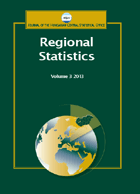Return migration and identity change: A Hungarian
case study
Return migration and identity change: A Hungarian
case study
Author(s): Gábor Lados, Gábor HegedűsSubject(s): Social Sciences, Economy, Geography, Regional studies
Published by: Központi Statisztikai Hivatal
Keywords: emigration;return migrations; identity change; remigration initiatives; Hungary;
Summary/Abstract: This study analyses the identity changes experienced by migrants returning to Hungary before,during, and after their stay abroad.Sussman’s (2011) cultural identity change model is used as a theoretical framework to which two factors, ‘skills’ and ‘family status’are added. Although identity change plays an important role in the success or failure of return, reintegration, and reemployment of returnees,to date this has not been studied in Hungary in detail. According to the research results, Hungarian returnees can be categorised into the same four groups as distinguished by Sussman (2011). Returnees in the affirmative identity group are found to be mostly low skilled migrants unable to integrate into the host society; as such, reintegration after their return is relatively easy. The members of the subtractive and additive identity groups can better integrate into the host country as they feel less attached to their native country than the affirmative group, but this causes various reintegration issues. The group of global identity shifters has the most natural reintegration process. Based on the research results, it is recommended that Hungarian return migration policies and initiatives should give greater consideration to these reintegration differences.
Journal: Regional Statistics
- Issue Year: 9/2019
- Issue No: 01
- Page Range: 150-167
- Page Count: 18
- Language: English

